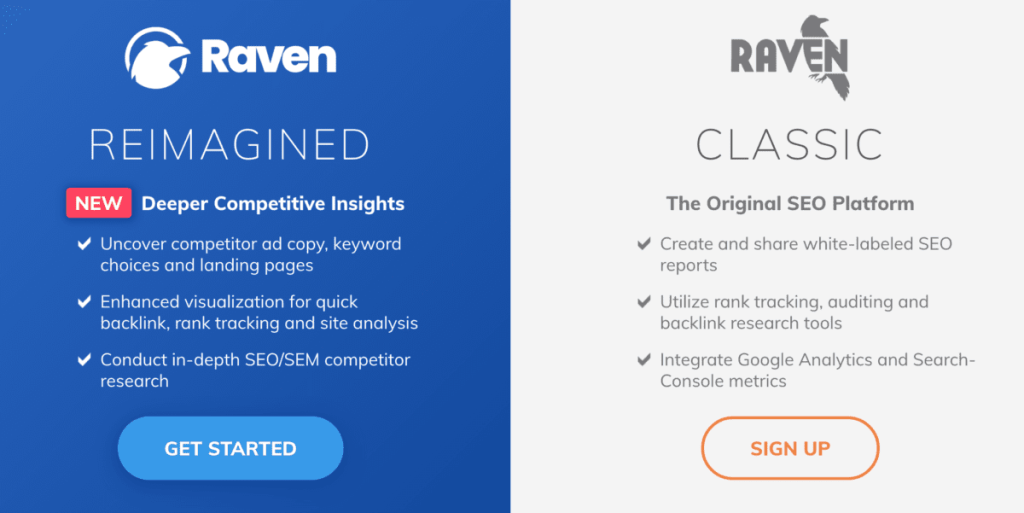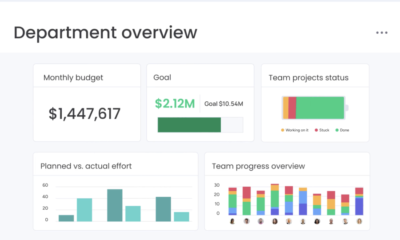Politics
Best Moz Alternatives of 2023
Published
1 year agoon
By
Drew Simpson
Every entrepreneur and small business owner needs to get SEO right if they want to be competitive in both the online and local markets in which they operate.
Making sure your website gets seen by the right people—your prospects—at the right time—when they’re ready to buy—is just the first-level challenge. You also need to make sure your site is optimized for local search traffic and ranking well organically to prospects who are in an earlier stage of the buyer’s journey.
To solve those business website challenges, many owners and entrepreneurs turn to reputable online SEO tools. For many years, Moz has been considered to be at the top of that list.
Moz and What It Can Do for Entrepreneurs
Moz Pro is a suite of SEO tools that includes keyword research, site audit, rank tracking, link building, and much more. One of the first SEO tools to hit the market, Moz Pro remains quite popular with businesses of all sizes.
However, some find Moz Pro to be prohibitively expensive, and many find its value—that is, what it offers in exchange for those high prices—to be less compelling than some of its competitors. While it does offer a free plan, that level provides access to limited features. Additionally, many users find the UI/UX (user interface/user experience) non-intuitive, with a steep learning curve.
These are just a few reasons why entrepreneurs might want to seek a different alternative to resolve their SEO challenges. In addition to tools offered by search engines, such as Google Search Console (a free tool that Google offers to help monitor site performance, indexing issues, and more), consider some of the Moz alternatives we’ve listed below.
1. Semrush
Semrush is a comprehensive suite of SEO tools that offers keyword research, competitor analysis, site audit, backlink analysis, and more. Like Moz, it will help you research and analyze keywords, including search volume, related keywords, and more.
Both sets of tools also help you choose keywords that are accessible and competitive, but SEMrush helps you assess how many links you’ll have to build in order to rank for that specific keyphrase. While Moz offers ranking data for results from Google, Bing, and Yahoo! Search engines, SEMrush only provides Google data.
SEMrush may also provide more help in the field of social media analysis with SM content optimization, management, and performance analysis tools. It offers a free trial, plus a free version with limited functionality as well as three paid plans.
Click here to try Semrush for free for 14 days.
2. Ahrefs

A popular SEO tool, Ahrefs offers keyword research, site audit, competitor analysis, backlink analysis, and more. Ahrefs lets you audit your own site for top keywords and performance, backlinks and anchor text, overall domain performance, and competitive domains.
Many users find the Ahrefs interface to be more simply designed and intuitive to navigate and use. It also provides robust domain data, including estimated domain traffic with the ability to view changes to a site’s performance over time.
Ahrefs will also show you keyword research data for ten search engines, not just Google. Like SEMrush, it lets you know how many backlinks you’ll need to build in order to rank well for selected keywords. Websites can use a free Webmaster tool’s version, or you can sign up for one of four paid plans.
3. Raven Tools

Raven Tools is a suite of SEO tools that includes site audit, keyword research, backlink analysis, rank tracking, and more. Users rank it especially highly for its keyword analysis and SERP (search engine results pages) rank tracking. Unlike some other alternatives on our list, it doesn’t offer a free version, but it does provide a free full-feature trial for seven days.
As part of its suite of tools, Raven Tools gives you access to SEO audits, on-page SEO analysis, SERP analytics, and page speed data. In addition, you can find tools for keyword tracking, backlinks tracking, and paid ad tools. With five paid plan levels from $50 to $480 a month, you can find the package that suits your business site’s needs.
4. Majestic SEO

Majestic SEO provides a backlink analysis tool that yields information on backlinks, anchor text, and referring domains. That’s the primary difference between Majestic and Moz. Whereas the latter site aims to provide a fully featured suite of SEO tools, Majestic is aimed at a narrower slice of the market. It does backlink analysis very well, however, including analysis of top incoming backlinks, tools to help you build more incoming links, comparison tools for your competitors’ domains, and other relevant metrics such as anchor texts and referring domains.
There are no free versions (and no free trial offers either, for that matter). Majestic SEO does offer three paid plans, which doesn’t provide as much choice as other sites we’ve profiled here. However, if you’re looking for help with your backlinks, it’s definitely one to consider.
5. Screaming Frog

Screaming Frog SEO Spider is a site crawler that helps you identify technical SEO issues on your site. It manually analyzes each page on your site for broken links, duplicate content, missing title tags, and much more. You can also connect it with your Google Analytics account to get the most out of the data your GA account generates for you.
Unlike many of the other Moz alternatives here, which operate on an SaaS web-based model, Screaming Frog is a desktop program for both PCs and Macs. It offers a free version and a single paid version that costs about $260 for a license that must be renewed yearly.
6. BrightLocal

BrightLocal provides a targeted set of tools that help you manage your local business listings, monitor customer reviews, and track your local search rankings. It’s a good choice if you’re looking primarily for local SEO and reputation management tools, with access to local SEO and Google business profile audit reports.
BrightLocal offers a two-week free trial with access to all features, as well as three paid levels to its all-in-one suite of tools. In addition, you can pay-as-you-go for access solely to its Citation Builder tools, starting at $2 per website, including submission to hundreds of sites, removing duplicate listings, and repairing errors in existing listings.
7. SpyFu

SpyFu is a competitive analysis tool that provides insights into your competitors’ SEO strategies, including their organic search rankings, paid search campaigns, and more. If you’re mostly in search of tools for competitor analysis, rank tracking, and domain comparison functionality, SpyFu is a good alternative to Moz Pro.
SpyFu offers both a free trial and a free version, as well as three paid versions that let you run customized monthly reports.
The Bottom Line
If you need a comprehensive set of SEO tools but Moz Pro is a little out of your price range, or more than what you need, there are lots of Moz alternatives you can choose from. Consider exactly what SEO needs your site is currently experiencing before you choose an alternative SEO tool to try. For example, if competitor analysis is more important to you, look at Ahrefs or SpyFu. If you’re more concerned about local SEO and SEM, consider BrightLocal.
Check for a trial period or a free plan in order to test out the interface and UX generally, since you’ll want to pick an option that feels intuitive to use and that you can navigate with relative ease. Make sure the plan you’re considering meets both your business needs and your budget. That’s the best way to make sure you’re using the right SEO tools for your business and website.
Published First on GRIT DAILY. Read Here.
Featured Image Credit: Photo by Oleksandr Pidvalnyi; Pexels; Thank you!
You may like
-


Chinese ChatGPT alternatives just got approved for the general public
-


8 Best Stake Casino Alternatives for 2023
-
Kajabi: Features, Pricing, Alternatives
-


Monday.com | Pricing, Review, Alternatives, FAQ
-


Alternatives to Layoffs in Tech: Maintaining a Stable Workforce
-


How Google Ads Marketing Stands Out From Alternatives
Politics
Fintech Kennek raises $12.5M seed round to digitize lending
Published
7 months agoon
10/11/2023By
Drew Simpson
London-based fintech startup Kennek has raised $12.5 million in seed funding to expand its lending operating system.
According to an Oct. 10 tech.eu report, the round was led by HV Capital and included participation from Dutch Founders Fund, AlbionVC, FFVC, Plug & Play Ventures, and Syndicate One. Kennek offers software-as-a-service tools to help non-bank lenders streamline their operations using open banking, open finance, and payments.
The platform aims to automate time-consuming manual tasks and consolidate fragmented data to simplify lending. Xavier De Pauw, founder of Kennek said:
“Until kennek, lenders had to devote countless hours to menial operational tasks and deal with jumbled and hard-coded data – which makes every other part of lending a headache. As former lenders ourselves, we lived and breathed these frustrations, and built kennek to make them a thing of the past.”
The company said the latest funding round was oversubscribed and closed quickly despite the challenging fundraising environment. The new capital will be used to expand Kennek’s engineering team and strengthen its market position in the UK while exploring expansion into other European markets. Barbod Namini, Partner at lead investor HV Capital, commented on the investment:
“Kennek has developed an ambitious and genuinely unique proposition which we think can be the foundation of the entire alternative lending space. […] It is a complicated market and a solution that brings together all information and stakeholders onto a single platform is highly compelling for both lenders & the ecosystem as a whole.”
The fintech lending space has grown rapidly in recent years, but many lenders still rely on legacy systems and manual processes that limit efficiency and scalability. Kennek aims to leverage open banking and data integration to provide lenders with a more streamlined, automated lending experience.
The seed funding will allow the London-based startup to continue developing its platform and expanding its team to meet demand from non-bank lenders looking to digitize operations. Kennek’s focus on the UK and Europe also comes amid rising adoption of open banking and open finance in the regions.
Featured Image Credit: Photo from Kennek.io; Thank you!
Radek Zielinski
Radek Zielinski is an experienced technology and financial journalist with a passion for cybersecurity and futurology.
Politics
Fortune 500’s race for generative AI breakthroughs
Published
7 months agoon
10/11/2023By
Drew Simpson
As excitement around generative AI grows, Fortune 500 companies, including Goldman Sachs, are carefully examining the possible applications of this technology. A recent survey of U.S. executives indicated that 60% believe generative AI will substantially impact their businesses in the long term. However, they anticipate a one to two-year timeframe before implementing their initial solutions. This optimism stems from the potential of generative AI to revolutionize various aspects of businesses, from enhancing customer experiences to optimizing internal processes. In the short term, companies will likely focus on pilot projects and experimentation, gradually integrating generative AI into their operations as they witness its positive influence on efficiency and profitability.
Goldman Sachs’ Cautious Approach to Implementing Generative AI
In a recent interview, Goldman Sachs CIO Marco Argenti revealed that the firm has not yet implemented any generative AI use cases. Instead, the company focuses on experimentation and setting high standards before adopting the technology. Argenti recognized the desire for outcomes in areas like developer and operational efficiency but emphasized ensuring precision before putting experimental AI use cases into production.
According to Argenti, striking the right balance between driving innovation and maintaining accuracy is crucial for successfully integrating generative AI within the firm. Goldman Sachs intends to continue exploring this emerging technology’s potential benefits and applications while diligently assessing risks to ensure it meets the company’s stringent quality standards.
One possible application for Goldman Sachs is in software development, where the company has observed a 20-40% productivity increase during its trials. The goal is for 1,000 developers to utilize generative AI tools by year’s end. However, Argenti emphasized that a well-defined expectation of return on investment is necessary before fully integrating generative AI into production.
To achieve this, the company plans to implement a systematic and strategic approach to adopting generative AI, ensuring that it complements and enhances the skills of its developers. Additionally, Goldman Sachs intends to evaluate the long-term impact of generative AI on their software development processes and the overall quality of the applications being developed.
Goldman Sachs’ approach to AI implementation goes beyond merely executing models. The firm has created a platform encompassing technical, legal, and compliance assessments to filter out improper content and keep track of all interactions. This comprehensive system ensures seamless integration of artificial intelligence in operations while adhering to regulatory standards and maintaining client confidentiality. Moreover, the platform continuously improves and adapts its algorithms, allowing Goldman Sachs to stay at the forefront of technology and offer its clients the most efficient and secure services.
Featured Image Credit: Photo by Google DeepMind; Pexels; Thank you!
Deanna Ritchie
Managing Editor at ReadWrite
Deanna is the Managing Editor at ReadWrite. Previously she worked as the Editor in Chief for Startup Grind and has over 20+ years of experience in content management and content development.
Politics
UK seizes web3 opportunity simplifying crypto regulations
Published
7 months agoon
10/10/2023By
Drew Simpson
As Web3 companies increasingly consider leaving the United States due to regulatory ambiguity, the United Kingdom must simplify its cryptocurrency regulations to attract these businesses. The conservative think tank Policy Exchange recently released a report detailing ten suggestions for improving Web3 regulation in the country. Among the recommendations are reducing liability for token holders in decentralized autonomous organizations (DAOs) and encouraging the Financial Conduct Authority (FCA) to adopt alternative Know Your Customer (KYC) methodologies, such as digital identities and blockchain analytics tools. These suggestions aim to position the UK as a hub for Web3 innovation and attract blockchain-based businesses looking for a more conducive regulatory environment.
Streamlining Cryptocurrency Regulations for Innovation
To make it easier for emerging Web3 companies to navigate existing legal frameworks and contribute to the UK’s digital economy growth, the government must streamline cryptocurrency regulations and adopt forward-looking approaches. By making the regulatory landscape clear and straightforward, the UK can create an environment that fosters innovation, growth, and competitiveness in the global fintech industry.
The Policy Exchange report also recommends not weakening self-hosted wallets or treating proof-of-stake (PoS) services as financial services. This approach aims to protect the fundamental principles of decentralization and user autonomy while strongly emphasizing security and regulatory compliance. By doing so, the UK can nurture an environment that encourages innovation and the continued growth of blockchain technology.
Despite recent strict measures by UK authorities, such as His Majesty’s Treasury and the FCA, toward the digital assets sector, the proposed changes in the Policy Exchange report strive to make the UK a more attractive location for Web3 enterprises. By adopting these suggestions, the UK can demonstrate its commitment to fostering innovation in the rapidly evolving blockchain and cryptocurrency industries while ensuring a robust and transparent regulatory environment.
The ongoing uncertainty surrounding cryptocurrency regulations in various countries has prompted Web3 companies to explore alternative jurisdictions with more precise legal frameworks. As the United States grapples with regulatory ambiguity, the United Kingdom can position itself as a hub for Web3 innovation by simplifying and streamlining its cryptocurrency regulations.
Featured Image Credit: Photo by Jonathan Borba; Pexels; Thank you!
Deanna Ritchie
Managing Editor at ReadWrite
Deanna is the Managing Editor at ReadWrite. Previously she worked as the Editor in Chief for Startup Grind and has over 20+ years of experience in content management and content development.
